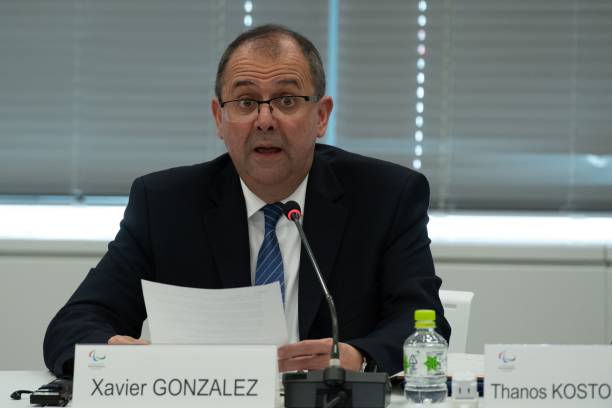The Paralympics, an event organized to allow those suffering from disabilities to compete for Olympic gold, is being rocked by claims that a “mind-blowing” number of its participants are faking the severity of their injuries.
Now, a call for sweeping reforms is being made by former International Paralympic Committee (IPC) officials.
Xavier Gonzalez, who helmed the IPC for 15 years between 2004 and 2019, cites evidence brought forth from several former athletes who tell of widespread cheating in the organization, the Australian Broadcasting Corporation reports. Specifically, Gonzalez claims that athletes would exaggerate their disabilities to gain entry to events they would otherwise not qualify to participate in.

Xavier Gonzalez, CEO of the International Paralympic Committee, holds a press conference, on May 17, 2018, in Tokyo, during a Project Review meeting with Toshiro Muto (not pictured), CEO of Tokyo Organising Committee of the Olympic and Paralympic Games (Tokyo 2020). (MARTIN BUREAU/AFP via Getty Images)
As the former head of the IPC, Gonzalez oversaw the organization charged with preventing this type of cheating. However, Gonzalez argues that a new investigative and enforcement body is needed to police the games.
Gonzalez has allies in bringing the exploitation of rules to light and arguing for a new body to implement rules.
In an IPC document acquired by Four Corners via the New York Post, “One official ultimately concluded that ‘the system does not work,’ while another noted that there were ‘no repercussions for those who cheat.’”
“Trying to do things with classification to win an advantage is not a thing that the Paralympic movement can tolerate,” Gonzalez said.
An example of one of the claims centers on Australian trike cyclist Stuart Jones.
Jones’ disabilities stem from a 2014 crash in which he suffered a severe spinal cord injury. Despite the severity of his injury, Jones was determined to continue competitive cycling and found a way to do so in the trike division. A trike is a three-wheeled bicycle that is only to be used by those who cannot ride a two-wheeled bike.
However, according to the report, Jones competed in non-paralympic events using a two-wheeled bicycle long after his 2014 accident.
As the New York Post reports, “His former partner, Sandy Kryzius, told Four Corners that Jones would also limp when he didn’t need to because he ‘needed to look disabled,’ and that it needed to be kept a secret that he could still ride a two-wheeled bike.”
Similar stories were shared by U.S. 12-time gold medalist and Paralympic legend Jessica Long, who attempted to sound the alarm about the rampant cheating in 202o. Long, who had both legs amputated below the knee before the age of two, lamented to Sports Illustrated about losing to athletes who should not have been in her category during the 2016 Games in Rio.

Gold medalist Jessica Long of Team United States celebrates during the Women’s 100m Butterfly – S8 Final medal ceremony on day 10 of the Tokyo 2020 Paralympic Games at Tokyo Aquatics Centre on September 03, 2021, in Tokyo, Japan. (Alex Pantling/Getty Images)
“I don’t want to seem like a poor sport, but I can’t watch this sport that I love continue to get destroyed like this,” Long told Sports Illustrated. “All of this is happening on a world stage, and no one in charge is doing anything about it.”
Basketball is another sport that has seen its fair share of fraud at the games. In 2000, the Spanish men’s team won gold despite none of the players having any “type of physical or mental handicap.”
What did Gonzalez do about the cheating during his time as head of the IPC?
In 2016, he launched an investigation into nearly 100 athletes accused of faking or exaggerating their injuries to compete in the Paralympics. However, no one was disciplined because the investigations failed to produce proof of cheating.
The IPC has pushed back against Gonzalez and his calls for a new investigative and enforcement body. The committee called it unnecessary, even though they did announce plans to review their classification system.


